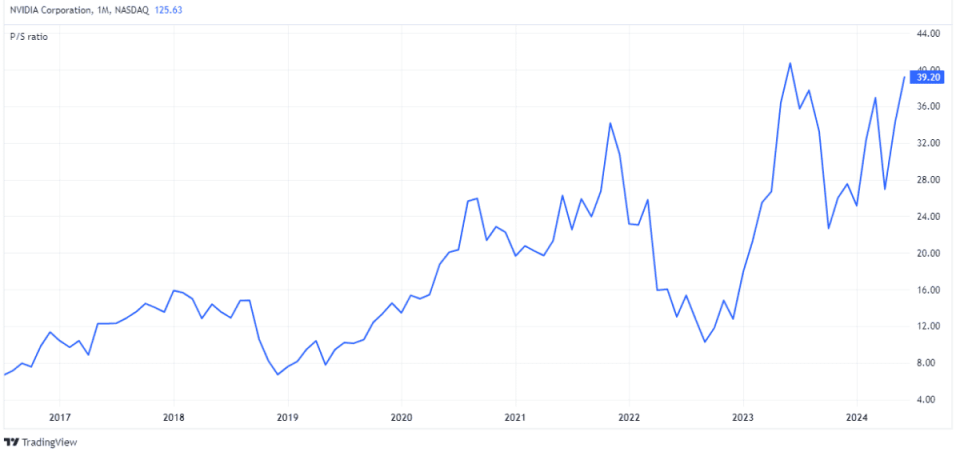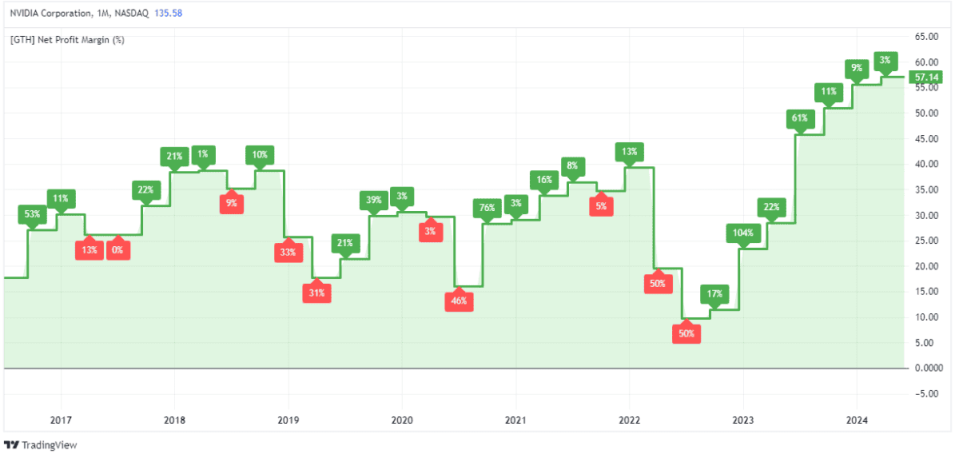Is Nvidia stock now becoming a joke?
Nvidia (NASDAQ: NVDA) stock continues to surge ever higher, reaching stratospheric levels. In recent days, the firm even supplanted Microsoft to briefly become the world’s most valuable company.
It’s now a $3.1trn colossus! Yet analysts at Evercore ISI reckon Nvidia’s market cap could one day reach $7trn and make up 15% of the S&P 500. Another broker predicts $10trn by 2030.
Has Wall Street become silly street? And is the Nvidia share price now simply a joke?
Echoes of Cisco?
We’re currently in the middle of the generative artificial intelligence (AI) gold rush. Nvidia, whose graphics processing units (GPUs) underpin most AI applications today, seems truly unstoppable.
But Tesla also appeared unstoppable in years gone by. Today, though, the electric vehicle (EV) pioneer seems far less formidable as it guides for “notably lower” sales in 2024. The EV mega-trend has hit a major speedbump and Tesla’s stock is now 55% off its peak.
AI is undoubtedly another mega-trend. Indeed, it’s arguably the biggest tech innovation to come along since the internet.
Speaking of which, Cisco Systems (NASDAQ: CSCO) was the Nvidia-esque winner of the late 1990s.
Its networking equipment enabled much of the internet and its revenue surged from $1.2bn in 1994 to $18.9bn in 2000. Unsurprisingly, Cisco’s share price also took off like a rocket and it became the world’s most valuable company.
Then the dot-com bubble burst and its stock fell more than 85%. It took two decades to recover on a total return basis, despite the firm continuing to grow its revenue.
Valuation
In 2000, Cisco stock was trading at a dizzying 39 times sales. Nvidia today? 39 times!

On the other hand, Nvidia is growing a lot faster than Cisco was at its internet-fueled peak. It reported revenue of $26bn in Q1 FY25, and it’s forecast to post another $28bn in Q2. That’s slightly more in two quarters than Cisco is expected to record for the full current year ($53.7bn).
Meanwhile, Nvidia’s Q1 net income of $15.2bn was more than the consensus forecast for Cisco’s full year ($15.2bn). And its net profit margin is currently above 50% versus Cisco’s 15% back in the day.

Moreover, the ‘Magnificent Seven’ group of AI-powered stocks — Apple, Microsoft, Google-parent Alphabet, Amazon, Tesla, Meta Platforms, and Nvidia — aren’t about to go bust like Pets.com and countless other start-ups did back then.
So for me, comparing the current AI revolution to the dot-com bubble — or Nvidia to Cisco — isn’t fully justified.
$2trn in 12 months
Still, I’ve been considering how it took over 100 years for a firm to reach a $1trn valuation. And how Nvidia went from $1trn to $3trn in just 12 months. Now some eager analysts are talking up $7trn and — gulp –beyond.
I wouldn’t go as far to call the Nvidia share price a joke, but my fear is that the valuation is simply unsustainable. Remember, hardly any companies are making profits from generative AI applications today. They’re being given away for free.
Consequently, I envisage more value destruction — particularly for subscription-based apps — than value creation when it comes to generative AI. Nvidia’s pricing power could decline as competition increases and demand wanes.
If I still owned the shares, I’d consider taking some profit while the going is good.
The post Is Nvidia stock now becoming a joke? appeared first on The Motley Fool UK.
More reading
Suzanne Frey, an executive at Alphabet, is a member of The Motley Fool’s board of directors. John Mackey, former CEO of Whole Foods Market, an Amazon subsidiary, is a member of The Motley Fool’s board of directors. Randi Zuckerberg, a former director of market development and spokeswoman for Facebook and sister to Meta Platforms CEO Mark Zuckerberg, is a member of The Motley Fool's board of directors. Ben McPoland has positions in Alphabet and Tesla. The Motley Fool UK has recommended Alphabet, Amazon, Apple, Meta Platforms, Microsoft, Nvidia, and Tesla. Views expressed on the companies mentioned in this article are those of the writer and therefore may differ from the official recommendations we make in our subscription services such as Share Advisor, Hidden Winners and Pro. Here at The Motley Fool we believe that considering a diverse range of insights makes us better investors.
Motley Fool UK 2024

 Yahoo Finance
Yahoo Finance 